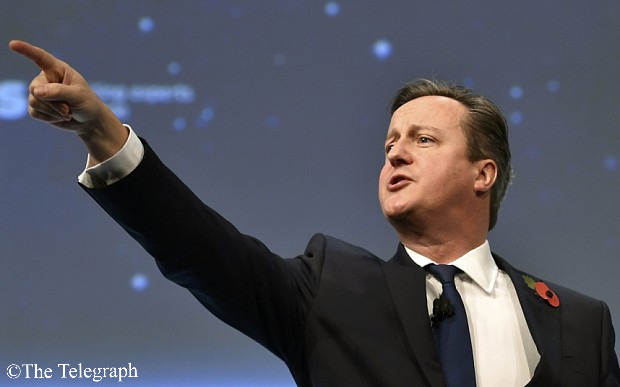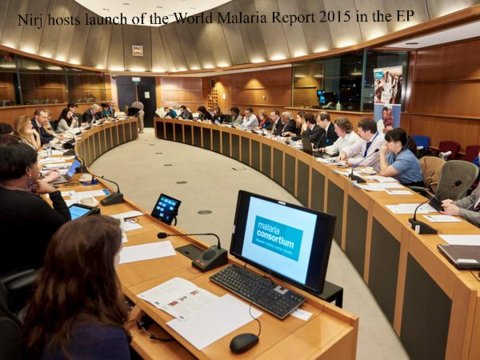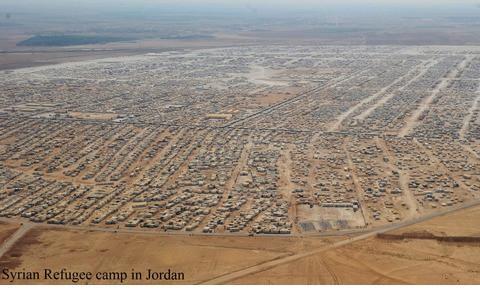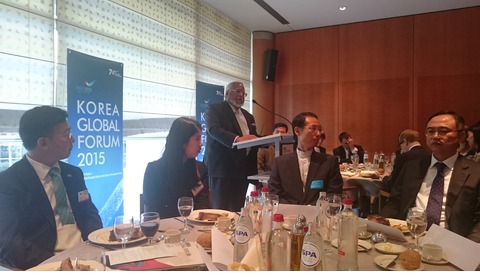| View this email online if it doesn't display correctly |
| | | | | |  |
Dear friends,
My previous
newsletter outlined the Prime Minister’s core demands from the EU
renegotiations. Since then, these
discussions have intensified and a possible timeline is beginning to emerge,
with things likely to come to a head at the European Council summit on February 18-19th. If the Prime Minister believes a satisfactory
deal can be finalised at this meeting, it is highly likely it will then be put
to a referendum this June. However, if
the Prime Minister comes away from the February summit feeling there is more
still to accomplish, he has plenty of time to continue negotiations, with the
option to put the referendum back to this autumn, or even down the road to 2017.
Any final deal
will of course have to sufficiently cover the four core demands of competitiveness, economic governance, migrant benefits, and sovereignty. There are
proposals for each of these that may, in theory, prove satisfactory. On the issue of competitiveness, a key factor could be to finally complete the
single digital market within the EU. This would have enormous potential not
only for Britain but the EU as a whole. Since the advent of the digital
revolution in the 1990s, Europe has fallen behind the US to a point where the
[inflation-adjusted] GDP per capita gap between the EU and US has increased by
around 50%. The moribund structure and
actions of the EU has actively hindered its own competiveness, with billions
wasted on vanity projects instead of R&D, venture capital financing or
investment in emergent technologies.
Furthermore, this lack of flexibility and competition deters the private
investment needed to make up for scarce public funds. Only through structural
reforms to the internal market can we hope to catalyse the investment Europe
needs.
While most
would agree to the advantages of a truly single market, the issue of economic governance between the
Eurozone nations and the nine non-euro member-states remains a sticking
point. This must be addressed in the
final offer; a legal caveat to prohibit discrimination from the Eurozone group,
who possess a qualified majority within the European Council and can ride
roughshod over Britain and the other non-Eurozone countries. Since 2009, Britain has been out-voted more
than any other Member State (in 12.6% of cases as opposed to the next highest
of 5.6%). Whether this will take the
traditional form of a veto, or present some form of blocking minority from the
non-euro nations (which has a precedent already established within the European
Banking Authority) is yet to be determined, but must be addressed as part of any
satisfactory deal.
One of the most
pressing and well publicised parts of the renegotiation has been what to do on
the issue of migrant benefits. Several solutions have been discussed,
including revisiting the definition of a worker – as the EU’s founding Treaty
of Rome refers to the free movement of labour,
not of people. By defining a ‘worker’
with specific earning thresholds and residency requirements, access to benefits
could be reduced across Europe, possibly requiring migrant workers to wait up
to four years before claiming in-work benefits.
This pan-European approach to benefit reform rather than exclusive
British concessions could prove agreeable to many EU nations, who also face the
issue of increasing benefit tourism.
Allies have also been found amongst the northern European nations to
potentially end the lunacy of child benefits being claimed by migrants for
children living in a different country.
Over and above
all else stands the inherently personal question of sovereignty. We want to be
in a common market not a common country. We want to pool resources on issues
that benefit from mutual cooperation but not be forced into unwanted
integration. To safeguard the
sovereignty of the United Kingdom, several options are being explored. There is the potential of a piece of
legislation clearly stating that the British parliament is sovereign and that
UK courts are not bound by the EU Charter of Fundamental Rights. Additionally, a mechanism could be established
to enable a group of dissenting national parliaments to form a blocking
coalition against EU legislation. All
this would have to be supported by a written declaration of Britain’s opt-out
of ‘ever of closer union.’
Come the
February summit, we will have a better idea of what progress has been made on
each of these core issues. I hope the
above information has helped to explicate some of the conceivable solutions. Whether the final package will prove
acceptable is of course up to you come the referendum. I should like to thank those of you who have
shared with me your thoughts on the matter, I am working through replying to
each in turn. If you have a query or
opinion on this great issue, please do not hesitate to get in touch at office@nirjdeva.com
|
| | Real results in tackling Malaria – but many more lives to save | |  |
This time last year, as the European Parliaments’ ‘Year of Development’ got underway, I stated that we were approaching something of a rare tipping point in the global fight against the scourge of malaria. Here was an opportunity to build upon the relative success of the Millennium Development Goals and I am pleased to say the results from last year are very encouraging. The number of malaria cases globally has fallen to 214 million, a decline of 18%. The number of malaria deaths globally fell to 438,000, a decline of 48%. One must remember that behind each number and statistic there is a real person and family whose lives are either enriched or ruined by our action or inaction. This global fightback against Malaria represents one of the most effective examples of multilateral cooperation, though there is still a great deal left to do.
The risk is that the pursuit of malaria elimination could become a victim of its own success, with the positive headlines leading to a reallocation of funding to other concerns. In addition to this complacency, several tangible factors threaten to derail what progress has been made, including a growing resistance in malaria mosquitoes to our current insecticides. This is a relatively new development and the necessary infrastructure to monitor cases of resistance simply does not exist in many of the poorest, worse affected nations. Indeed, the lack of preventative and medical infrastructure within these countries, particularly in sub-Saharan Africa, continues to be the largest issue in tackling malaria. It will come as no surprise that those with the weakest healthcare systems continue to maintain high numbers of malaria fatalities. In such countries, families have little choice but to resort to spending up to 50% of average household expenditure on malaria-related healthcare.
So what more can be done? One emergent but not yet fully utilised avenue is deeper involvement from the private sector. Due to the threat posed to their workers by the disease; oil, gas and mining companies in particular have driven forward the anti-malaria campaign. Chevron, the global fund's largest single corporate donor, has invested €50m, while the Corporate Alliance on Malaria in Africa (CAMA) and the Global Business Coalition (GBC) have been founded by numerous companies to assist in financing and facilitating malaria intervention projects. Yet, to date, we have failed to fully harness the extraordinary potential of the private sector.
The ‘year of development’ may be over, but this is something we must continue to push. A larger involvement of the private sector; better monitoring and infrastructure from the local governments; continued funding into vaccine research from the EU; and enabling the NGOs on the ground. This is something we have the ability to defeat, we must not shirk in our efforts to make this happen.
|
| | Syrians need more aid closer to home, not grandstanding on migrant numbers | |  |
In my previous newsletter, I raised a number of concerns with Chancellor Merkel’s decision to unilaterally circumvent the established European policy on asylum seekers and to benevolently pledge ‘unlimited migration’ into Europe. The consequences of this edict are well publicised and have further demonstrated that well-intentioned but ill-judged moral grandstanding of this kind has compounded the difficulties we face rather than alleviating them.
Chancellor Merkel is not alone in her mistake. This inane, media-fuelled pursuit of virtue-signalling is readily adopted by other politicians, who naively believe that who is more compassionate boils down to the total sum of migrants you want to ‘allow in.’ Thus, we have the leader of the opposition reducing the complex issue of a civil war in Syria to whether we should accept 3,000 migrants currently situated in France (a somewhat safe, stable nation). But what of the other ten million Syrians who have been displaced during this war? Why is it right to offer all we can to a minority of migrants who pay to travel through Europe to the borders of Britain instead of the millions currently situated in refugee camps of the contiguous nations to Syria? The notion that successful trafficking to Calais makes one a preferred case over those suffering in the established aid camps is profoundly unfair and a dangerous example to set to those who have legally and justly followed the established process.
The truth of the matter is that Britain has spent more on improving the conditions within the neighbouring camps, where the majority of refugees reside, than the rest of the EU put together. If certain EU leaders wish to grandstand on numbers, they could start with the amount of money they are putting into the relief effort. We need to improve Syrian lives, not just with clothing, shelter and food, but also by investing training in skills and education, so that when this conflict finally ends and the post-war recovery begins, the displaced can return to their homeland equipped with the means and the funding to rebuild Syria. Further financial, medical and logistical support to the neighbouring refugee camps is the only viable way of helping the ten million.
|
| | In pursuit of peace for the Korean Peninsula | |  |
As Chair of the European Parliament's Delegation for Relations with the Korean Peninsula, it was with alarm and bitter disappointment that I received word of the test detonation of a Thermonuclear Hydrogen bomb in North Korea, last month. Such an openly provocative demonstration is likely to derail any diplomatic progress towards a lasting peace on the Peninsula, not to mention exacerbating tensions in a region featuring Chinese, Japanese, South Korean and US military bases, all in close proximity.
Today, we face a number of growing concerns towards this region’s stability. The United States, with its shift of emphasis both strategically and militarily from the West to the Asian Pacific, coupled with China’s increasing assertiveness on its territorial claims, a re-arming Japan, a prominent Russia and the continuation of hostilities between North and South Korea, makes it an area of increasing geopolitical concern. Certain assurances need to be made immediately if we are to prevent the disastrous possibility of a conflict in the wider region.
Today, the only thing that separates North Korea and South Korea from war is an armistice, signed in 1953; designed to be a temporary placeholder until “a final peaceful settlement is achieved.” It seems self-evident that the first small step on the long road towards reunification is to finally establish a formal peace treaty; one which is signed by all the relevant regional players, including the United States, China, Japan and Russia.
Now, you may well ask why on earth the European Parliament and Nirj Deva have been asked to get involved in such a matter! Well in the small, interconnected world of international relations, the EU finds itself unusually placed to mediate in this particular environment. Since the Six Party talks in 2009, the EU has represented an entity which has arguably been leading on behalf of the West, holding open channels of communication with both the North and South. Moreover, the Delegation for Relations with the Korean Peninsula has worked hard to maintain an active and steady dialogue with officials from both sides in order to garner support for an eventual peace treaty and will be working closely with all the relevant regional players with the hope of making this a reality. The road forward will likely prove obstinate to say the least. Nonetheless, we will continue in our efforts to establish some form of détente before tensions escalate any further.
|
| Defending British sovereignty against EU military proposals
| |  |
January's plenary session saw the unwelcome return of calls to force European nations into a permanent defence union, with integrated military forces and an EU command structure. The move to resurrect this federalist dream was rather cynically concocted in response to a French invocation of Article 42.7 of the Lisbon Treaty following the Paris attacks, which states:
“If a Member State is the victim of armed aggression on its territory, the other Member States shall have towards it an obligation of aid and assistance by all the means in their power”.
You may notice (though the federalists conveniently overlook it) that the article states “the other member-states have towards it an obligation” – as opposed to the ‘EU institutions’. And indeed, without the need for cumbersome EU command structures and the loss of sovereignty that goes with that, Britain (with the democratic approval of the British Parliament) has certainly fulfilled its duty to France in stepping up its military and logistical support against ISIS.
It is unconscionable to me that federalists have commandeered the tragedy in Paris to provide a convenient backdrop for EU military integration. As my colleague and Conservative Defence Spokesman Geoffrey Van Orden MEP stated:
“Instead of a practical resolution showing solidarity with France the opportunity has been hijacked by those who want to push for an EU Army. This is totally unacceptable. We have long warned about the dangers of EU defence ambitions which can only be at the expense of our national sovereignty and of the vital NATO alliance. Many were dismayed when the Lisbon Treaty included a mutual defence clause, which is almost a complete copy of NATO's Article 5. The EU itself has no credible ability to respond to such requests from its member states. In any case, 22 of them are NATO members and the remainder have participated in some way in NATO activity. There is no excuse therefore for this action.”
It exemplifies astonishing hubris on the EU’s part that while many of its southern member-states continue to stagger from one economic crisis to the next, thoughts turn instead to expanding the EU’s foreign policy mandate, emboldened with its own “autonomous” military. Sadly, in the same way their economic union has weakened, their dreams of British, French and German brigades marching under an EU flag would diminish, not enhance our security. We must continue to oppose every step towards weakening our own capabilities in favour of handing them over to an ill-prepared Brussels.
|
| | More from the January plenary session
| | Conservative MEPs demand action on Steel | | In my previous newsletter I raised the inaction from the EU on threats to the steel industry. With a thousand more Tata Steel jobs lost in the UK in January, it is imperative that swift action is finally undertaken to do what we can to provide a fair and equal footing for British steel. Our priorities are threefold:
- Action to tackle illegal dumping. The dumping of cheap steel from external nations is severely affecting all European steel producers. The EU has not hesitated in the past to impose anti-dumping duties on foreign imports and should do so again in this case.
- Tackling energy costs for heavy industry. The agreed Energy Intensive Industry Compensation Package is not being implemented quickly enough to alleviate the issue.
- Boosting investment. Financial intervention into such industries is highly regulated by the EU. These rules need to be examined and if necessary changed.
|
| More thought needed on changes to firearm controls | | In the wake of the Paris atrocity, a worthwhile debate began on firearm controls throughout the EU. Nevertheless, some of the hastily drafted proposals would have done nothing to prevent the Paris attack whilst having a negative impact on museum owners and collectors, sporting organisations, groups such as the Countryside Alliance, military re-enactments, the film industry and even the harmless pursuit of paintballing. My Conservative colleague, Vicky Ford MEP, is taking the lead in drafting suitable changes to the initial proposals to ensure they are proportionate and effective against the real security issues we face.
|
| Conservative victory to axe 17 million pieces of EU red tape | | | A
ludicrous proposal from the Commission; one which demanded paperwork
filed to the EU on every single package coming into Europe has been
halted in its tracks. Packages with a value of £17 or under - an
estimated 17 million packages a year - will now be exempt from this
costly and time-consuming bureaucracy, which had the potential to
cripple small courier and delivery firms. |
| EU propaganda is not the answer to Islamist radicalisation | | | The federalists within the European Parliament have long sought to re-educate people into identifying as “European citizens.” The latest attempt came from a Labour MEP who published a report claiming teaching people to identify as European citizens is the solution to tackle Islamist radicalisation. Perhaps this move was well-intentioned however such issues are the responsibility of nation-states and fall well outside the mandate of the European Union. Tackling extremism within our schools is a matter for the British government to confront and not an excuse to politicise lessons with EU propaganda. |
| Reforms on CAP penalties to help farmers | | | Simplifications to the Common Agricultural Policy will include fairer and more proportional penalties. This will include a new ‘yellow card’ system, meaning the amount of penalties for genuine mistakes by farmers will be significantly reduced. My colleague and Conservative spokesman on agriculture Richard Ashworth MEP played a prominent role with his report into how new technology for area measurement can be utilised to make this new system viable. |
| | | | | | I will be back in touch with you again very soon. In the meantime you can check my website www.nirjdeva.com for regular updates and if I can be of any assistance to you on anything raised here or anything else for that matter, please do not hesitate to contact me at nirj.deva@europarl.europa.eu.
|
|
|
|
| | | | | |